May 07, 2025
May 07, 2025
Abstract
This paper examines Rajender Krishan’s Amma’s Gospel and traces out some secrets which are essential for happy and successful life. A few excerpts from Amma’s Gospel have been quoted here to prove the standpoint that Rajender Krishan is didactic and philosophical in his poetry. Life is a riddle and only a mystic can understand its mystery. Amma recommends him not to follow the path of deceit. The best prayer is to offer gratitude. She recommends accepting life as it is. To be true to one self is the first condition for getting success and happiness in life. Responding in haste without anticipating and reflecting leads a man into trouble. To live in the present is the best way to live life. For her, it is better to be immersed and become the Witness. Amma’s mysticism lies in her belief in the inevitability of death. The poet also gives space to the monster corona and Amma’s technique of fighting against it.
Keywords
Spirituality, Gospel, Corona, Mystic, Gratitude, pairs of opposites, Maya, Destination
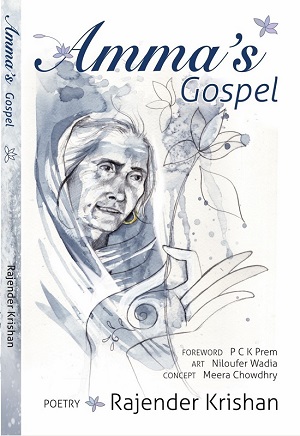 India, a land of unity in diversity, bubbles with spirituality. A man who takes birth here is filled more or less with the spiritual fire. He may leave India but cannot wipe out spirituality, imprinted on his inner self. This is quite applicable to the diasporic poets who migrated from India but couldn’t leave the spiritual sparks. Rajender Krishan (1951), also known as Raj Chowdhry is such a diasporic poet who migrated to New York, USA in 1989. He has revealed the spiritual sparks in his poetry collections, titled, Solitude and Other Poems (2013), Amma’s Gospel (2020) and Wanderer (2021), which demonstrate his admiration for the poet Kabir and deep-rooted love for India’s culture. Sunil Sharma in “Previews” writes:
India, a land of unity in diversity, bubbles with spirituality. A man who takes birth here is filled more or less with the spiritual fire. He may leave India but cannot wipe out spirituality, imprinted on his inner self. This is quite applicable to the diasporic poets who migrated from India but couldn’t leave the spiritual sparks. Rajender Krishan (1951), also known as Raj Chowdhry is such a diasporic poet who migrated to New York, USA in 1989. He has revealed the spiritual sparks in his poetry collections, titled, Solitude and Other Poems (2013), Amma’s Gospel (2020) and Wanderer (2021), which demonstrate his admiration for the poet Kabir and deep-rooted love for India’s culture. Sunil Sharma in “Previews” writes:
Rajender Krishan is free of academic paraphernalia – of the heavy burden of theories and schools – and comes across as a refreshing voice in an age of the FB poetry where, sadly, anything goes unlegislated, in the name of free verse and blank poetry – words strung together, at their best…(152)
As a poet, Rajender Krishan is reflective and didactic. The Bhagavad-Gita has influenced him. All the Indian sanskars, which he learnt from his Amma are deep-rooted in him. A few excerpts from Amma’s Gospel have been quoted here to prove the standpoint that Rajender Krishan is didactic and philosophical in his poetry. While praising Amma’s Gospel, Sunil Sharma writes: “Amma’s Gospel is full of startling comments about mysteries of life, death, cessation, rebirth of different kinds … and of charged words that have got a strange luminosity of their own through interaction with Holy Scriptures and point to a rightful conduct” (153-54). Certainly, Amma’s Gospel illumines the reader and shows him the solid cultural foundation.
The poet in Rajender Krishan wonders at the human cycle that begins with birth and ends with the death. The struggling life remains in between. A human being keeps himself busy right from morning till late at night while reflecting and doing all such activities as are necessary for life. He produces what he wishes and consumes the things that he acquires. He creates as well as destroys. He builds and rebuilds the things. He sees his way finally going towards one goal—the goal of death. What he produces does not go with him. Rather he leaves good or bad name or things which the next generation inherits. He is trapped in this world. The plan is to trap man in between life and death and keeps him engaged in activities for acquiring the things which he cannot carry with him to the next world. Amma does not wonder at this journey of human being and so calls it “a mere play / the inexorable Leela”(55). Here is the excerpt that reveals this journey of human beings right from the beginning of birth to death:
In the journey of
the human cycle
from birth to death
we are busy
producing, consuming,
acquiring, dumping
creating, procreating
building, destroying
…and rebuilding …
eventually
leaving something behind
good, bad, or ugly
for the next generation
to inherit (Amma’s Gospel 53)
It seems that the poet Rajender Krishan in the poem “Cyclical” is much influenced by Matthew Arnold’s “Rugby Chapel” which reveals the truth about the course of life. Here is the excerpt from “Rugby Chapel”:
What is the course of the life
Of moral men on the earth?—
Most men eddy about
Here and there—eat and drink,
Chatter and love and hate,
Gather and squander, are raised
Aloft, are hurl’d in the dust,
Striving blindly, achieving
Nothing; and then they die—
Perish;—and no one asks
Who or what they have been
The poet knows that “Life is the only constant / that is forever changing” (Amma’s Gospel 119). Hence, he always asks the man to “contemplate and transcend / by discovering / the essence of Life” (Amma’s Gospel 119). What is important in life is “the essence of Life” and man’s endeavour should be only to discover it. When he transcends and discovers this essence, he begins to understand the real meaning of life. Life, particularly human life is very complex. It is a philosophical concept. The more a man attempts to understand it, the meaning of life changes. Outwardly it seems to be constant but it always moves on and changes. It is a puzzle or riddle along with its many variables. Only a yogi or a mystic who moves on the path of spiritualism is the only right person to understand life. Life throws the trap in which man is trapped and the moment he understands it, it becomes too late as he finds his way going towards the grave. How naturally the poet reveals the philosophical truth in such simple lines from the poem “Life”!
Life – the eternal mystic
moves on
with its own conundrum
of paradoxes, riddles , puzzles
in myriad hues
of vagaries and variables. (Amma’s Gospel 121)
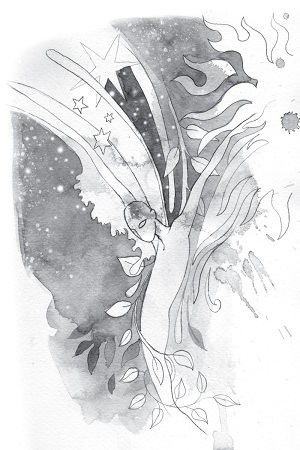 The truth is that man neglects nature while the truth is that he cannot live without her. He is dependent on her. He is dependent on her for space, air, water, fire and earth. The sooner man realises it, the better it will be for him. He should acknowledge his dependence on them and feel gratitude towards all. A man cannot live alone. He is not an island in himself. He needs essentials to live life. He gets the essentials from others. Hence, he must be thankful to all—known and unknown as they helped him in supporting and living life smoothly. To be dependent does not mean dependence but it becomes independence as no one can live alone. Here is an excerpt from the poem “Independence” which reveals the very mantra of living life happily:
The truth is that man neglects nature while the truth is that he cannot live without her. He is dependent on her. He is dependent on her for space, air, water, fire and earth. The sooner man realises it, the better it will be for him. He should acknowledge his dependence on them and feel gratitude towards all. A man cannot live alone. He is not an island in himself. He needs essentials to live life. He gets the essentials from others. Hence, he must be thankful to all—known and unknown as they helped him in supporting and living life smoothly. To be dependent does not mean dependence but it becomes independence as no one can live alone. Here is an excerpt from the poem “Independence” which reveals the very mantra of living life happily:
Offer gratitude to all
known and unknown
past and present
as without being
dependent on them
one cannot get
essentials to live
and celebrate life (Amma’s Gospel 127)
What a man sees is life but what remains unseen is also life. Life is a coin with its head and tail. Binaries make a life complete. Life lies in “the pairs of opposites” (Amma’s Gospel 113). These pairs become the head and tail of the same coin. If there is ocean, there is mountain also. Joy has its value because of sorrow and sorrow because of joy. Joy ends in sorrow and sorrow in joy. This is the truth. Outwardly, duality appears but the moment man understands life, sees singularity. Hence, the opposites are the two sides of the same coin. The poet who has learnt it from his Amma states this aspect of life in a very simple manner:
Love and hate
heaven and hell
joy and sorrow
birth and death …
as the obverse and reverse
of the same coinOne is amazed by this duality
as the singularity of Oneness
that the Gurus talk about (Amma’s Gospel 113)
The poet in Rajender Krishan follows what Amma has taught him. Amma has elaborated every aspect of life not only to satisfy his curiosity but also to make him understand what life is. He recalls the things which he has not to do in life if he wishes to live meaningful life.
Stop electing
the path of deceit
in the journey of life
The path of deceitfulness
makes you the key contestant
against your very own self (Amma’s Gospel 45)
Amma recommends him not to follow the path of deceit. If a man deceives the other man, he does not deceive that man but deceives himself by deceiving him. She never asks to do anything that may be against self. Amma recommends love but first she asks to be true to oneself. It does not show selfishness but when one loves oneself loves all the selves. That person takes everyone in his embrace. The same divine is present in everyone. Hence, a man should be true to his own self and if he does so, he will love his own self. The poet states Amma’s repeating advice of being true to oneself thus:
Love, by being true to yourself
become capable to envelope
everyone in your embrace (Amma’s Gospel 65)
...I hear Amma reiterating:
Love yourself
by being true to yourself (Amma’s Gospel 72)
Amma knows the value of prayer. The poet asks her how to pray. The best prayer, for her, is to offer gratitude. It is gratitude which gives fortitude and the shower of the Divine’s Grace. The best riches are not in gold coins but in accepting “Life as it is” (Amma’s Gospel 49). Longings will remain longings as they cannot be fulfilled. It is better to accept the truth. Amma’s advice “There are no better riches than / acceptance of Life as it is” (Amma’s Gospel 49) seems to be relevant in today’s scenario as man is running after money and always remains dissatisfied with what he has. The very crux of Amma’s Gospel which the poet has turned into refrain in the book is revealed in these nine lines.
Love yourself
by being true to yourself
Be not in haste to react
First anticipate then contemplate
and
then respond
Follow the right path
Be happy
Be successful (Amma’s Gospel 41)
This is very living mantra of life. The poet has used these lines in the book at many places. These lines have become a refrain as the poet wishes to remember them and does not want to make the reader forget. If a man follows the message of these lines, he will lead a very successful life. A man can love himself better if he is true to himself. To be true to one self is the first condition for getting success and happiness in life. Responding in haste without anticipating and reflecting leads a man into trouble. Hence, first anticipate and then reflect before giving any response. The right path should be chosen. If a man follows in life what Amma tells, he will be happy and successful in life. This is the essence of the gospel of Amma who always follows it and asks others to follow in life.
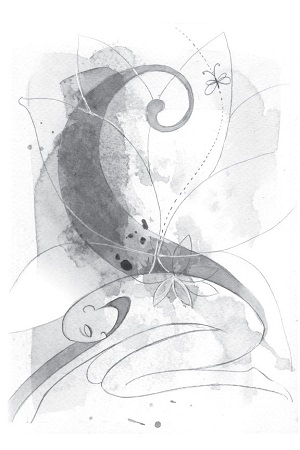 Amma treats a man as a human being. She does not differentiate on the basis of caste, creed or colour. She sees the Supreme Soul which is present in all beings. This Supreme Soul is the Witness that sees everything. Amma always advises to greet everyone with smile and folded hands. The poet regrets as he thinks of the time when he will learn Amma’s gospel. Amma explains the truth behind it. When a person shows gratitude with smile to the rich as well as the poor, he does not bow down before the concerned person but he bows down before the Witness that pervades all. Mark the lines for the poet’s revealing Amma’s Gospel and his own question of the time of learning it:
Amma treats a man as a human being. She does not differentiate on the basis of caste, creed or colour. She sees the Supreme Soul which is present in all beings. This Supreme Soul is the Witness that sees everything. Amma always advises to greet everyone with smile and folded hands. The poet regrets as he thinks of the time when he will learn Amma’s gospel. Amma explains the truth behind it. When a person shows gratitude with smile to the rich as well as the poor, he does not bow down before the concerned person but he bows down before the Witness that pervades all. Mark the lines for the poet’s revealing Amma’s Gospel and his own question of the time of learning it:
Conveying gratitude
With a pleasing attitude
You merely do not greet
Every big and small
Essentially you bow
To the Witness
That pervades all.
When will I learn? (Amma’s Gospel 40)
Life is not running here and there. It is neither in the past nor in the future. It is in the present. ‘Now’ is the word that fits life. Amma advises everyone to live in the present life.
Remember,
Life is in the Now
of cause and effect
Not in the past nor in the future (Amma’s Gospel 58)
The poet asks the reader not to be indulged in shadows and advises to “transcend the limit” in order to “experience / Now as Eternity” (Amma’s Gospel 95).
Amma asks everyone to be silent in order to listen to the murmuring of life. She advises not to be attached to a person or a thing. It is better to be immersed and become the Witness. The Witness is the only Sovereign to whom a man should surrender in all humbleness. For her, the Witness is “the eternal concept of independence” (Amma’s Gospel 127).
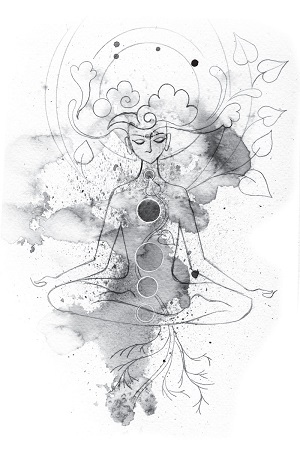 Amma follows the lesson of detachment, given to Arjuna by Krishna in the Bhagavad-Gita. Detachment is nothing but simply a stage of disconnecting at will from any activity. It is to see the show and not to be in the show. How naturally, the poet reflects over the concept of detachment and narrates it in a simple poetic language thus!
Amma follows the lesson of detachment, given to Arjuna by Krishna in the Bhagavad-Gita. Detachment is nothing but simply a stage of disconnecting at will from any activity. It is to see the show and not to be in the show. How naturally, the poet reflects over the concept of detachment and narrates it in a simple poetic language thus!
Detachment is
the ability to switch off
disconnect at will
from any action and simply be
with the self within
relaxing and enjoying
the greatest magical show
of the moment
by being still and silent (Amma’s Gospel 137)
The problem is not in being ignorant but lies in too much learning. A man who has a desire to achieve something learns the art of getting the desired thing. This happens with all the people of the world. The man is trapped and lost in the dark world of desires. But, quite contrary to such a man, is the mystic who does not learn but tries to unlearn what he has learnt till now. This is the process through which he wishes to have nothing. The mystic wishes to be silent in order to hear the silence that lies within. The poet narrates the very nature of a mystic thus:
Desires compel learning
to accumulate something;
The mystic by unlearning
evolves to arrive at nothing (Amma’s Gospel 115)
The mystic is never entangled in the maya or the world of illusion. A thing that was present yesterday will not remain tomorrow but is present in the present. This is itself a mess. The poet asks if it is not trickery, then what it is. The poet in the poem “Maya” reveals the very nature and character of Maya which is nothing but an illusion. Here is the brief poem “Maya”:
That
what was not
yesterday
but is
today
and will not be
tomorrow
If it is not trickery
—an illusion—
then what is it? (Amma’s Gospel 133)
Amma’s mysticism lies in her firm faith that “Death is inevitable” and so she asks to “sleep with gratitude / for the ultimate dawn” (Amma’s Gospel 66). A man gets the result of what he does. Amma believes in “the karmic seed” (Amma’s Gospel 147). The seed of karma which is sown today will turn into the fruit tomorrow. It depends on the seed whether it will be a prize or a punishment. She emphasizes to listen to “the sound of silence” which a man can do if he chants Om which is “primordial energy” and “the only verse / manifesting eternally / the Universe” (Amma’s Gospel 33).
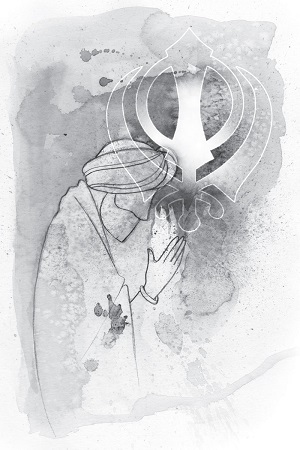 The poet is much influenced by the poems of Kabir. His poem “Gurdwara” demonstrates the echoes of Kabir. The poet has achieved the possession of ego. This ego is the only hindrance on the way of crossing the gate. The Guru stands at the gate while God or the Supreme is on the other side of gate. It is only Guru who will make him meet the Supreme by removing the ego. The only condition is that if he wants to be “one with the One”, he will have to be ready for the removal of his ego. The poet presents the mystical truth in a very natural manner thus:
The poet is much influenced by the poems of Kabir. His poem “Gurdwara” demonstrates the echoes of Kabir. The poet has achieved the possession of ego. This ego is the only hindrance on the way of crossing the gate. The Guru stands at the gate while God or the Supreme is on the other side of gate. It is only Guru who will make him meet the Supreme by removing the ego. The only condition is that if he wants to be “one with the One”, he will have to be ready for the removal of his ego. The poet presents the mystical truth in a very natural manner thus:
“I” will cease
Even the concept of “God”
will disappear
The realization
The attainment
—will simply be—
the primordial energy
the sound of the silence
Ik Onkar Satnam (Amma’s Gospel 103-104)
The poet in Rajender Krishan becomes philosophical when he talks of heaven and hell. But, the approach that he follows is practical. For him, heaven and hell are in this world and a man remains either in hell or heaven according to his own temperament. Following a very practical attitude, he believes that if a man is welcomed with “hugs and smile” when he reaches home after doing toil, he is in heaven. “Sweet home is the heaven” as it reflects “one’s virtues / and good deeds” (Amma’s Gospel 139). If he is neglected, he is in hell. “Wretched hell is the house” which mirrors “cruelty / immorality and misdeeds” (Amma’s Gospel 139). Heaven and hell are not after death; they are now present in a man’s own home which reveals his temperament of his personality.
The poet recalls his father in the poem “My Father always said” which reveals the pieces of advice about parenting. He remembers his father who holds his hand and tells him to remember his guidance which is “merely a path / not the destination” (Amma’s Gospel 83). Paths change with the passage of changing times. If he finds a path which is different from his father, he should discard it and follow his own path if it leads to the destination. Destination is what counts in life. He also advises him not to impose his own criterion on his children. He offers a practical message to his son but this message is for all. In a didactic tone, he says:
Impose not on your children
your footprints, rules and criterion
simply lend them
a helping hand
that’s full of true love and motivation
so that they experience Freedom
to walk on a path
that will lead them
to the destination (Amma’s Gospel 83-84)
For him, parenting is merely a path. The path changes with times, but the destination never changes. For him “the destination / always is emancipation / of the Self” (Amma’s Gospel 84).
Rajender Krishan does not close his eyes to the contemporary scenario which is disfigured by the monster of Corona. This monster Corona has swallowed the innumerable lives of people. It has raised its head for destructive dancing. The poet, who is aware of the pandemic Corona, presents it thus:
Ever since Corona
raised its ghostly head
for a ghastly dance
to the pandemonium tunes,
causing death and disruption
everyone is anxious (Amma’s Gospel 71)
Everyone is worried about this monster Corona. In this tough time, the poet recalls Amma and wonders how she would have reacted to the monster Corona. Her gospel offers him a therapeutically healing. He recalls her gospel—the gospel of not fearing death which is inevitable. She advises to follow the Patanjali sutras and feels that rigorous discipline is needed for facing such pandemic.
Always remember
but fear not Yama
for death is inevitable
Know and follow Yam
the Patanjali sutras
of self-control (Amma’s Gospel 71)
The sutras that she recommends are relevant for all times. Hence, these sutras have become aphorisms. She asks to follow the path of “TO BE” and avoids the hellish path of “NOT TO BE” to face the situation that Corona has created across the globe.
TO BE
clean, committed, content,
honest, kind, loyal, non-violent
persevering, poised and tolerant,
and
NOT TO BE:
a cheat, greedy or a thief. (Amma’s Gospel 72)
The man who follows the pieces of advice given by Amma will always be happy, wealthy and wise. This is Amma’s practical advice which the poet recalls in the time of Corona and which is equally relevant even today.
Sunil Sharma in “Previews of Memories: Wisdom and Benediction” praises Rajender Krishan’s offerings and calls them “deceptively simple” though they are “in reality, very profound” (152). What the poet writes seems to be simple but on the deeper level, words have deep meanings. A man gets what he deserves. This very idea is expressed in such simple words: “You get what you deserve / Only when it becomes due” (Amma’s Gospel 50). The poet uses the Hindi words and avoids translation as he knows they will lose the very ethos that they emit out. He uses “diya” (Amma’s Gospel 37) and “aarti”( Amma’s Gospel 37) which displays the Indian scenario. Nandi and Shiva (Amma’s Gospel 91) also appear in the book. Sometimes he uses internal rhymes when he writes a line like “offering gratitude brings fortitude” (Amma’s Gospel 49). He turns simple words into poetic words by the touch of his pen when he recalls his Amma. “She walks down my memory lane” (Amma’s Gospel 37). He does not use figures but sometimes alliteration like “distressful delusion” (Amma’s Gospel 87) can be seen. He fills simple words with meanings. His victory lies in making simple lines into exceptional lines which reveal didactic and philosophical reflections. No doubt, figures of speech are absent but the poet in Rajender Krishan makes Amma, in the words of Neera Pradhan, “a universal figure ready to hold hands to navigate through the labyrinth of life” (156). It is the magic of his didactic pen that he makes everyone feel Amma’s presence on every page of Amma’s Gospel. He makes her exist “in everyone whether visible or invisible as if she is the Supreme” (Foreword 27). In brief, Amma’s Gospel is didactic in tone and the message it conveys is philosophical and quite relevant in life.
Works Cited
Courtesy: This paper was first published in the December 2021 issue of Episteme
15-Jan-2022
More by : Dr. Sudhir Kumar Arora